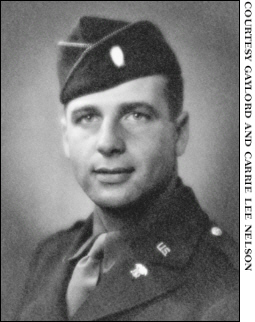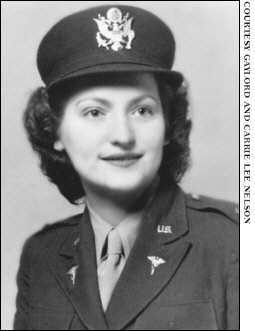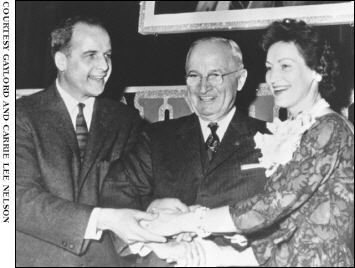Tom Brokaw (27 page)
Considering what they had all been through, they emerged from the war with a remarkable appetite for public service, for “doing good,” as so many of them now describe it. It was a natural extension of the patriotism and training of the war years, but it was not a short-term phenomenon. It was the ethos of the time. Get married, have a family, stay married, do something for your community.
The Dumbos and the other World War II couples in Yankton were in the forefront of every community-improvement project. The two doctors, Hubner and Auld, served terms as president of the local school board, pushing through reforms to get equal pay for women teachers and to raise the place of girls' athletics in a state where boys had the only games in town. Vivian Auld became a force in building a new public library.
It was a generation of joiners. They belonged to the Masonic Lodge or Knights of Columbus, the VFW and the American Legion, the Elks, the Rotary, Kiwanis, and Toastmasters International. The wives were in PEO, a popular women's service organization.
As children of the Depression, they managed their new prosperity carefully. Within the Dumbos an extravagant purchase, a fancy new car or a boat, would trigger a round of sharp kidding. As couples, they all shared a natural resistance to conspicious consumption. Moderation in spending was as important to them as faithful marriages, well-behaved children, and church.
They were all active in their various religious faiths well beyond regular attendance at Sunday worship. As Episcopalians, the Aulds and the Gatchells helped start the 20-40 Club for adults over twenty and under forty. They raised money for St. Mary's, a local school for girls from the Sioux reservations. Later Hack Hagen became active in national Lutheran church efforts to counsel conscientious objectors during Vietnam. As a World War II veteran, far from being bitter toward those who chose not to serve in Vietnam, he says, “I learned about compassion.”
Don and Lois Gatchell, who now live in Tulsa, Oklahoma, remember life revolving around family, friends, church, and community, and all of the couples approached it as a team effort. Well before the phrase “extended family” came into vogue, these couples were just that. They vacationed together, celebrated birthdays and holidays together, and supported each other during difficult times. I remember them to this day in tandem: Vivian and Merritt; Doc and La Verne; Hack and Joyce; Lois and Don.
That was not unique to this group or just to Yankton, of course. Moreover, it's not that these values were absent before the war. However, America had never been subjected to an explosion of marriages, births, prosperity, and population shifts of this magnitude. The landscape was being transformed in every conceivable way and the place of marriage and the family was critical to the management of it all in an orderly fashion. What makes it all the more remarkable in contemporary terms is that the couples were so young. It was not unusual for a young man and woman to have three children, mortgage payments, and expectations of a lifelong career in one company by the time they were thirty.
Lois Gatchell believes their marriages were strengthened by those months and years of difficult, often frightening separation in the early stages. “I believe we were all determined to make it work as a result of that,” she says. Don adds, “Expectations were different. We had a higher regard for marriage. You just didn't divorce.” And if they hit a bump in their relationship, they worked it out between themselves. They were too busy putting their lives back together, too grateful that they had emerged from those difficult years alive and together again, to dwell on the occasional hitches in their relationships.
Outside of our own families, to those of us growing up in Yankton at the time, these World War II couples were emblematic of the values that shaped our lives. In many respects, their marriages and the way they conducted them were a form of community service.

Gaylord Nelson

Carrie Lee Nelson, 1945
GAYLORD AND CARRIE LEE NELSON
“We didn't have much, and we didn't expect much. . . . We
struggled, but we kind of liked the struggle. We had love and
friends, and our aspirations were right, so it was a good time.”
G
AYLORD NELSON
, later the governor of Wisconsin and a U.S. senator from that state for three terms, was the son of a smalltown physician when he enlisted in the Army, a self-confident and fun-loving bachelor who already had a law degree. He was headed back to Wisconsin after the war to pursue a career in politics, hoping to follow in the footsteps of his boyhood hero, Senator Robert La Follette.
Carrie Lee Dotson came from markedly different circumstances. She was the ninth child of a couple in Wise County, Virginia, the heart of Appalachia's coal country. When she was just three years old, her father died and her mother was forced to place her in a home for poor children run by the Masonic lodge in Richmond, Virginia. Two of her brothers were already there.
Carrie had big dreams as well, although hers were rooted more in fantasy than reality. After all, she was a poor, overweight child in a foster home. Nonetheless, she looked at pictures of dashing, famous women like the flier Amelia Earhart and the glamorous tennis player Alice Marble and thought she could be like them.Of course, she says now, she had no idea what that truly meant, as she didn't have access even to a newspaper, much less to flying or tennis lessons. Instead, when she was eighteen, she went to nurse's training, a popular choice among young working-class women who couldn't afford to go to college. Carrie Lee also considered that if she couldn't be Amelia Earhart, she could still become a flight attendant.
Instead, at the end of her nurse's training, she qualified for Officer Candidate School within the U.S. Army Nurse Corps, and after basic training she put on her second lieutenant's bars and reported to Fort Indiantown Gap, Pennsylvania, where a blind date would change the direction of her life forever.
It was near the end of the war, in the spring of 1945, when a friend asked her to double-date with a couple of young Army officers. Carrie Lee's date was Gaylord Nelson, and her first impression was mixed. She thought he was cute and funny but that “Gaylord” was a dumb first name. They had a nice time at the movies, and later, over a few drinks at the Officers Club, Gaylord told her about his Wisconsin upbringing, but there were no sparks flying. At the end of the night he put her on the bus back to her nurses' ward.
She was a little surprised when the next day there was a phone call for her from a general. It was, in fact, “General” Nelson, and this was Carrie Lee's first encounter with Gaylord Nelson's deep streak of mischief. They continued to see each other until it was time for him to ship out. Carrie Lee admits she was smitten, but she didn't expect much from Gaylord because he'd made it clear he didn't write to anyone, not even his mother. So, as Carrie says, “That was the end of thatâfor that time.” And as Gaylord says, “I never expected to see her again.”
Gaylord Nelson had the unusual experienceâparticularly unusual for a young man from Wisconsinâof commanding a company composed entirely of black soldiers. The son of the president of Liberia was his first sergeant, and he was the highest-ranking “Negro,” as blacks were called in those days. This was for Gaylord a very personal experience with racial discrimination. “Every post I was on,” he says, “the black troops were assigned to World War I barracks. The white troops got into the brand-new barracks with central heating. They stuck the black troops in barracks heated by coal stoves. I began to seeâin a minor way, of courseâhow it was to be a minority and be discriminated against.”

Gaylord and Carrie Lee Nelson meeting Harry S Truman
Nelson and his soldiers were assigned to Okinawa after the fierce battle for control of that island, and they were there when the war ended. He fully expected just to kill time there and get back to whatever life had in store for him in Wisconsin. Little did he know that someone else was also headed to Okinawa.
Carrie Lee had made the long journey to Okinawa to work as a replacement nurse in a hospital that was being deactivated. She was not happy about the assignmentâmost of her friends were going to the Philippinesâbut as she came ashore she encountered a young Army lieutenant checking off the nurses' assignments. Carrie Lee remembers that the lieutenant said, “Hmph, Dotson. Weren't you at Indiantown Gap?” When she said yes, he went on, “Didn't you go out with Nelson? He's on this island.” Carrie Lee says that in those days she didn't say things like “No shit, Joe!” but she might as well have. When the lieutenant said, “I'll have to tell him you're here,” she replied, “Yeah, do that, will you?”
When Gaylord was told that Carrie Lee was on the island, he decided to look her up. By then he was a captain, but again he mischievously told the guard at her barracks, “Tell Lieutenant Dotson that General Nelson is here.” When she came out to greet him, he exclaimed, “Jesus Christ, you're skinny.” She responded, “Jesus Christ, you're not a general.” As she says now, more than a half century later, “So we found each other.”
The Okinawa courtship proceeded apace. Carrie Lee had to stay on the island until the spring of 1946, so Gaylord extended his assignment as well. By the end of their time there Gaylord had given her “a little silver band that one of his soldiers had madeâtook quarters and pounded them into rings.”
Eventually Gaylord went back to Madison, Wisconsin, to open a law practice, and Carrie Lee returned briefly to Virginia before agreeing to move to Wisconsin. She became a nurse at the University of Wisconsin while they continued their engagement. They were married in November 1947.
Gaylord was a popular and hardworking young lawyer, but he wasn't making much money; looking back, Carrie Lee believes it's just as well. “We didn't have much, and we didn't expect much,” she says. “We had spaghetti dinners with jugs of red wine. We struggled, but we kind of liked the struggle. We had love and friends, and our aspirations were right, so it was a good time.”
When Gaylord got more deeply involved in politics, Carrie Lee wasn't as happy, but it never occurred to her to demand that he give up his boyhood dream, not even when she felt like a single parent as he campaigned and she stayed home with their children.
When Gaylord became the first Democrat elected governor of Wisconsin in fifty years, Carrie Lee, the child of Appalachia and a Masonic home for children, was suddenly the best-known woman in the state. It was an honor she didn't cherish. She describes her role as first lady: “I tolerated it. I never liked all the scrutiny. I had a miscarriage during Gaylord's first term, and I resented it when the press wrote about it. I felt the same way when our third child was bornâwhy my pregnancy had to be in the news, I don't know.”
Nonetheless, she rarely complained. In turn, Gaylord never asked her to change her ways, not even when some of his political advisers warned against her easy use of mild profanities. Her maverick ways appealed to his own bold sense of humor. He gave her space and she did the same for him. They had mutual friends, but they also had separate friendships, and they didn't impose one set on the other.
When Gaylord was elected to the U.S. Senate and they moved to Washington, it didn't get any easier for Carrie Lee. The capital was a city of protocol alien to her background in the Masonic home. The Nelsons had only Gaylord's Senate salary to support their family of five, so though Carrie felt pressure to maintain an expensive wardrobe, there was very little left over for her to indulge herself with fancy dresses, even if she had been so inclined. As Carrie Lee says, “We'd never been in debt, and we didn't intend to start now.”
Gaylord's trips back home to Wisconsin to tend to his political base meant that Carrie Lee had an expanded role as a single parent. She admits that this “strained the marriage,” but there was never a thought of divorce. Her sense of isolation was more than offset by the love she felt for Gaylord and their family. It was, she says, “a wonderful dream to have that family after my childhood.”
Because of their refreshing independence, the Nelsons quickly became one of the most popular couples in Washington. At the peak of Gaylord's power as a senator, Carrie Lee was an equally dynamic presence whenever they entered a roomânot always the case with political wives. But then she didn't play by the rules. She was wholly at ease with herself and her background, cracking jokes, deflating big egos with a well-aimed verbal dart or a slightly profane comment. She was comfortable with the men and women of the power circles.
Looking back, Carrie Lee is certain that despite their vastly different childhoods, her and Gaylord's marriage worked so well because they had confidence in each other. Even when they disagreed, they worked to find common ground, and they never fought in front of their children. She says now that if she were to do it over, she'd be more assertive about Gaylord spending time with the family, but all in all, she is grateful that she was on the right boat and in the right line when she reported for duty in Okinawa. Otherwise, she might never have run into “General” Nelson and traveled a world far beyond the Masonic home for children in Richmond.
As for Gaylord, whose ancestors are Norwegian, he likes to tell the story of Ole, the stereotypical Norwegian, who once confided to a friend, “It's all I can do to keep from telling the kids how much I love their mother.”

